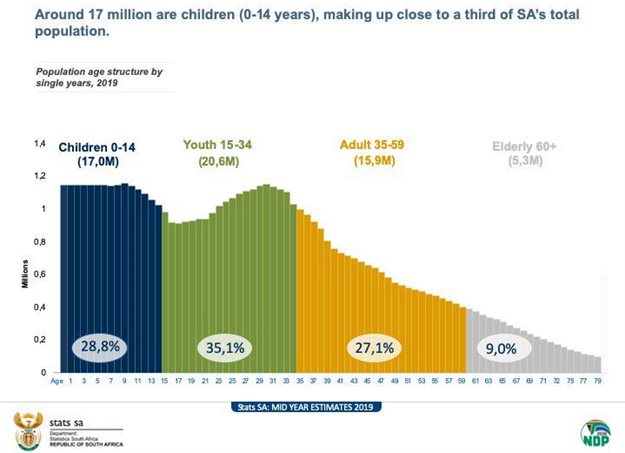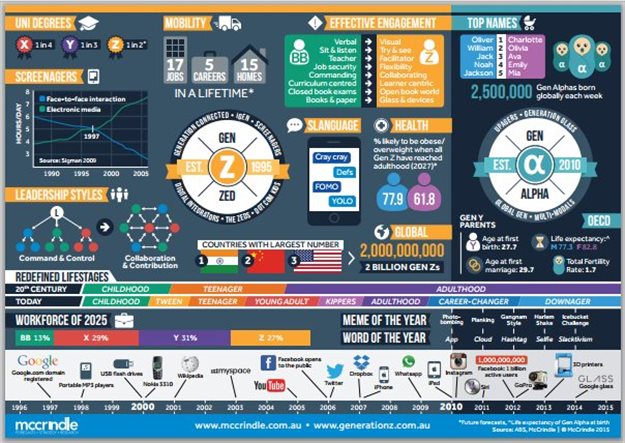#BizTrends2020: Educating Gen Alpha

Gen Alpha’s are society’s youngest. Following on from Gen Zs are the pre-schooler and kindergarteners of today. And according to McCrindle, there are 2.5 million Gen Alpha’s born around the globe each week.
According to a survey carried out by British company Bullguard:
The leading cause of Gen Alpha’s early development was technology, including access to digital devices, Facebook and Google. The proliferation of these tools has allowed children to quickly absorb a wealth of knowledge that was unavailable to previous generations.As children are ‘growing older’ younger, this means that the youths’ needs are increasing, and constantly changing in terms of their age-specific requirements – including faster education and larger rates of intellectually stimulating content with which to engage.
Outsmart their parents by age 8
South Africa, as with most developing countries, has an overwhelmingly youthful population. The Joe Public ‘Generation Fluid’ White Paper states:
According to the most recent estimates, it is noteworthy that close to half of the country’s total population (i.e:. a segment totaling around 27 million people) falls within the age bracket of 0-24 years.Statistics SA says around 17 million, or a third of the South African population, are below the age of 14.
With such a large youth population, a key question is to ask is whether we are critically assessing educational formats, methodology, content or studies for the generation whose experience has vastly altered, due to the introduction of the internet and advancing technology.
Are educational institutions adapting at a pace aligned to the needs and intellectual capacity of the youngest generation, whose technological dexterity is undeniable — a generation that will reportedly, “outsmart their parents by the age of 8”?
“Generation Alpha will be the most formally educated generation ever, the most technology-supplied generation ever and, globally, the wealthiest generation ever,” says McCrindle, in an article titled ‘Why We Named Them Gen Alpha’.
Digitally native does not mean digitally exclusive
Though Gen Alphas are digitally native, they’re not digitally exclusive. In the most recent Sunday Times Next Gen Awards, respondents listed
God, family and parents as the top things they could not live without in 2019, with social media, internet and television sitting in the 8th, 9th and 10th slots respectively.
Well, unlike for the generations before them; internet, social media and television have always been there. It’s a given, it is expected rather than a new exciting development or innovation.
As Gen Alpha engage with tech intuitively, they absorb and consume information and entertainment at a rapid tempo. Simultaneously, they are learning soft skills at an unprecedented rate: problem-solving, multi-tasking and quick thinking.
To engage with these bright young minds, we will need to offer them an opportunity to be able to seamlessly manoeuver across the digital and the physical worlds. They also want to see consistency across those experiences.
They want to work to save the planet
As a result of their upbringing, awareness and a technological world that knows no geographical boundaries, 59% of Gen Alphas would like to work somewhere saving lives, 51% want a job where they can use technology to make a difference and echoing the rallying cry of Gen Z climate activists such a Greta Thunberg, 67% of 6- to 9-year-olds say that saving the planet will be the focus of their career.
That’s according to the Wunderman Thompson Commerce Report.
Given this, and considering factors such as automation, urbanisation and an older population, we have a fairly clear picture of what the job market will look like in the next 10 years and beyond.
A recent study by the Foundation for Young Australians (FYA) found that nearly 60 percent of young people in Australia are currently training for careers that will be two-thirds automated in the next 10 to 15 years.
The study lists cashiers, bank tellers, textile workers, taxi/Uber drivers, pilots and telemarketers, amongst many others, as those that will inevitably be replaced by automation, AI or further technological advancement.
If our recent bank and taxi strikes are anything to go by, South Africa is not removed from the impact of advancement or replacement.
Jobs that will be displaced by new tech in the next decade
A 2019 report by McKinsey & Company, as quoted by Business Tech, states:
Against the 4.5 million potential new jobs created, we estimate that these technologies could displace 3.3 million existing jobs by 2030.. It further states that some “jobs in these roles will, therefore, not be completely replaced – but they might decline in number, as fewer people are required to perform the same roles”.
A crucial question is whether we, as leaders, thinkers and businesses, are going to remain a ‘reactive’ country, or applying our knowledge, insights and foresight to be proactive.
Being proactive means we will set and support the South African educational system to provide the correct foundation for the youngest of the population, the future workforce, future leaders and our future consumers with the correct skills to succeed.
Are we advancing our educational faculties in sync with the pace of change that is required?
Or are we denying the future of South Africa the opportunity to live a better life with secure employment, the ability to rectify the wrongs of our past and leave the legacy of adversity, inequality and poverty to continue its ripple effect into the future, for younger generations to solve?
To only hear in the words of Greta Thunberg’s 'You did not act in time' speech directed at MPs for the 2019 UN Climate Action Summit: “My message is that we'll be watching you,” as a challenge to leave our country better than we found it.


















































